The Blessing (Hebrew: Bir'chat Strong's# 1293) of the LORD, it makes rich, and He adds no sorrow with it. Proverbs 10:22
The Hebrew word for Blessing comes from the Hebrew root word meaning to kneel down. We see this in the story of the servant of Abraham when he goes to find a bride for Isaac. And he made his camels to kneel down (Hebrew:Bar'akh Strong's #1288) Genesis 24:1. We also see this in 2 Chronicles 6:13 where Solomon is standing upon his brass platform and kneeled down upon his knees before all the congregation of Israel, and spread forth his hands toward heaven. This word in Hebrew for blessing has a concrete picture of kneeling down before someone to show respect. In the eastern cultures, we still see this as many Japanese peoples will bow their head in respect to another or how in the monarchies of the world a lady will bend her knee while bowing before a member of the Royal family.
Back to the story of Abraham's servant, we see that he brought with him ten camels of the camels of his master. The word for camel in Hebrew is Hebrew: Gah'mool which sounds very similar to our English word camel. Camels are able to travel many distances without water for many days due to water storage in the humps on their back. They are also strong animals that are able to carry heavy burdens. A Hebrew word which comes from this same root word, camel, is used in Psalm 103:2: Bless the LORD, O my soul, and forget not all His benefits (Hebrew: Gah'moo'laiv). It is the Hebrew masculine plural possessive tense. In a literal since you might read this verse as, Kneel before the LORD, oh my soul, and forget not all His camels. How interesting that Abraham's servant brought ten camels, but no word is mentioned of anyone else coming with him. Were all those camels used to bring gifts to the future bride of Isaac and her family? For in verse 53, we read: And the servant brought forth jewels of silver, and jewels of gold, and raiment, and gave them to Rebekah: he gave also to her brother and to her mother precious things. Genesis 24:53
 |
Another place in the book of Psalms, we find this root word "Gah'mool" used. It is in Psalm 119:17 Bestow upon Your servant that I should live, and guard Your word. Therefore, I conclude that the Hebrew word for blessing and camel are both linked together.
Although, the New Testament was preserved in Greek, we know that most of the writers of the New Testament were first Hebrew/Aramaic speakers and their thought processes were Hebrew. When the Apostle Paul, who was born and raised as a strict, Hebrew speaking Jew was writing to the Ephesians, he wrote: Blessed be the God and Father of our Lord Jesus Christ, Who has blessed us with all spiritual blessings in heavenly places in Christ. Ephesians 1:3
In light of our new understanding of the words blessing/kneel, camel/bestow, may I propose a different translation of this verse: Kneel before the God and Father of our Lord Jesus Christ Who has bestowed on us all spiritual benefits and abundant gifts in heavenly places in Christ. I do wonder when the Apostle Paul was penning these words, did his mind think of Abraham's servant and Rebekah?
Gamaliel (pronounced GAHM'Lee'el in Hebrew) was a great grandson to Manasseh. We also find that the Apostle Paul was taught under one, Gamaliel, who was a very respected sage and rabbi in Talmudic times, quoted very often throughout Jewish writings. He was a grandson of Gamaliel the Great. This name in Hebrew means "God is my reward", but more literally would mean, "God is my Camel".
In the United States, you might hear someone on Wednesday wish another, "Happy Hump Day". This is often represented with a camel. Wednesday is the middle of the work-week, therefore the HUMP day. In light of this, I wish each of you all God's blessings and store for your lives, on this day.
Original posting 12/27/2021

